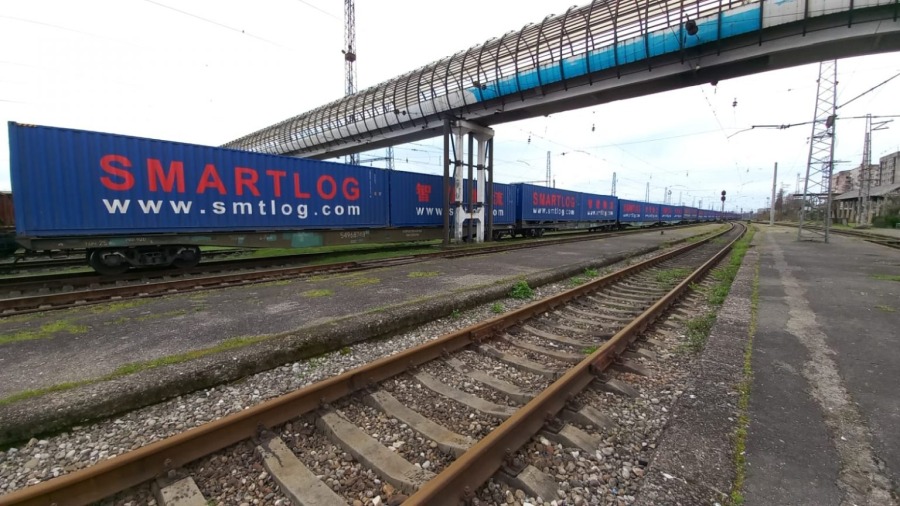Akhra Aristava: "Containers arrived in Abkhazia for the first time, but cargo has been coming before this as well"

Akhra Aristava
Ekho Kavkaza ― Recently, a notification appeared on the website of the Republican Unitary Organization "Abkhazian Railway," stating that "for the first time in the history of the Abkhazian railway, a container train arrived at the Sukhum station - this is a linear logistics service, a freight train."
"Containers carry a wide range of cargo," and the train that arrived in Abkhazia consisted of 62 containers with a total cargo weight of 2,700 tons. The arrival of the freight container train was called the "first sign" by Alias Labakhua, Deputy Chairman of the State Customs Committee of Abkhazia, who expressed hope that despite the modest customs payment, "the state budget will be collected penny by penny."
Economist Akhra Aristava commented on the news about the container train in an interview with Ekho Kavkaza [Echo of the Caucasus] and did not share the optimism of the official from the State Customs Committee.
Akhra, what do you think about transit in general and the arrival of the first freight container train in Abkhazia, as reported by RUE "Abkhazian Railway"?
– Of course, transit is beneficial for the railway and seaports as it provides jobs and income, but I don't see many reasons for optimism. Firstly, transit has been established for a long time. If you recall, there was a scandal in Turkey regarding the origin of coal. I think that was two years ago. It was unclear whether Russian coal was being transported to the Republic of Turkey through Abkhazia or if it was some other coal, but there were protests from Georgia, so I would not publicly discuss these questions yet.
How do transit cargoes from Russia proceed in Abkhazia?
– Cargoes are transported by rail or by road, arrive at our ports (either Ochamchira or Sukhum), are reloaded onto Turkish ships, and then continue to Turkey or other countries. This has been the practice for many years.
It is reported that 62 containers have arrived in Abkhazia; is this a significant number? And what are these containers?
– Container transportation is a common practice worldwide - cargo is ordered, and it is transported in containers. Containers are very convenient because they fit perfectly on railway platforms in terms of size, and when reloading onto ships, they can be easily transferred and then delivered to the customer. This form of delivery is called container shipping. There are even huge ocean liners called container ships. Containers have arrived in Abkhazia for the first time, but the cargoes were different before: from Turkey to Abkhazia and then to Russia, or conversely, from Russia to Abkhazia and then to Turkey.
In this transit that Alias Labakhua is talking about, Georgia does not participate; cargo comes from Russia to Abkhazia, is reloaded onto ships, and sent to Turkey. Do I understand you correctly?
– Yes, you are absolutely correct. The Republic of Georgia is not involved in this in any way, and most likely, they will protest over this again and again. There have always been many protests from their side.

Alias Labakhua says that Abkhazia gains almost nothing from this transit since the customs payment is small, but "the very fact of such a procedure on our territory speaks volumes: today one delivery, tomorrow another, and so the budget of our state is collected penny by penny." Does the state have any profit from this transit or not?
– In the situation in which the Republic of Abkhazia finds itself, this opposition from the Georgian authorities and the law on the occupied territories greatly hinder the development of transit. As for the customs fee, it is insignificant and does little in terms of customs payments. It is possible to fully load the railway in transit, but customs duties will still be insignificant.
Why?
– Because the rate is meager, and, by the way, this is a global practice. Here we are talking more about the workload of business entities: the railway will work and will have revenue and income; and seaports will have income, then they will naturally pay taxes. But I don't think that this type of activity will be able to cover and provide for the needs that our country requires. I want to remind you that we have a deficit in the republican budget of 1 billion 700 million rubles [Around $22M -ed]. And the Customs Committee itself, in the quarterly report, announced that they have an increase in payments to the republican budget of only 7%. Today, I don't see what our government is doing and how it is going to cover this deficit. We need to talk about more realistic matters and discuss how to increase exports. Look at the reports; exports are practically not growing when you take inflation and rising prices into account. It has stagnated for four years now! This means that domestic production is also practically not growing, that the economy is in stagnation, and that's what we need to talk about.
Akhra, how do you think this transit is related to the circumvention of sanctions?
– I think it is related. Due to the fact that Western sanctions concern not only financial or commodity flows, the sanctions also affected logistics. There are bans on cargo transportation and rail transportation from the West. Of course, these are the consequences of these sanctions, and of course, businesses are looking for channels and ways to deliver and exchange goods, and it turns out that Abkhazia suits their needs now.
From the point of view of transit, what is the particular value of Abkhazia? Can it handle large or small flows of goods, and what are its capabilities?
– Our capabilities are limited, as our ports have always had a small capacity for transshipment of goods. There has been no reconstruction, no new capacities added, and large ships cannot enter our port. Ships with a displacement of 2.5-3 thousand tons can enter, which is a small tonnage, and therefore the possibilities are limited. If an investor is interested, the Ochamchira port has been offered as an investment site in the past, but unfortunately, the implementation of this project takes many years; you cannot build a port in just two days. And those cargoes that will now go through Abkhazia will be small batches with limited volumes.
Akhra, based on your experience, what cargoes from Russia go to Turkey?
– This mainly involves energy sources - coal, metals, and everything that the Turkish economy needs. It is primarily raw material. In return, most likely, parallel imports go through Turkey. There were negotiations in Turkey, representatives of the European Union visited, and the US Treasury Secretary flew in; they are trying to block this channel. This is not connected with Abkhazia; it is more related to Georgia and Armenia, as there are far greater opportunities for transshipment of goods since Soviet times. Official statistics show that Georgia has increased its exports to Russia by almost 40%. Naturally, they could not increase domestic production by such a volume, so I say that all this is unstable, and all these issues related to transit are uncertain because the confrontation is ongoing in the world. You can plan one thing, but you might end up facing a completely different situation.
This interview was published by Ekho Kavkaza and is translated from Russian.